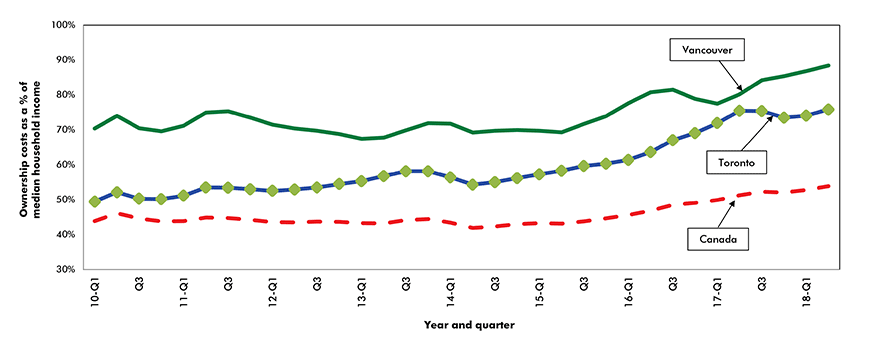For some time, economic pundits have been predicting a major price correction in Vancouver and Toronto. Put another way, they considered that housing prices in both of these metro areas were significantly overvalued, “in bubble territory”, and that there was a significant risk that this price bubble would burst in the near future.
For example, in mid-2012 the International Monetary Fund’s Canadian real estate model indicated that house prices were overvalued by 13% and that they would likely decline by 6% through 2015.
Although this same dire outlook for the Canadian housing market has been repeated frequently over the past six years, average house prices for the country as a whole have increased by 46.5%, led by gains of 68% in Toronto and by 62% in Vancouver.
Over the past eighteen months, governments in B.C., Ontario and Ottawa have introduced measures designed to cool house prices. First, the introduction of the Ontario Fair Housing Plan in April, 2017 was largely responsible for a 9%-drop in house prices between June, 2017 and January, 2018 in Ontario. In addition, the more restrictive mortgage approval regulations put in place by the Office of the Superintendent of Financial Institutions at the beginning of 2018 have further depressed house prices during the first half of this year. Third, in its first budget, the B.C. NDP government introduced a new tax on property speculators and higher taxes on foreign property buyers.
The latest national sales numbers clearly indicate that these measures are putting a drag on housing demand across the county as a whole and particularly on the targeted Vancouver and Toronto markets. For the country as a whole, home sales are down by 11.7% year to date while average house prices have fallen by 4.9%.
In Vancouver, sales are down by 28% year to date while average prices are up by a mere 2.5%. In Toronto, a 20% year-to-date drop in sales has been accompanied by a 7% drop in average house prices.
While there is plenty of evidence that housing demand is cooling in Canada’s two hottest markets, two recent reports suggest that the risk of a major price correction in both markets is greater than it has been since 2008.
First, according to the recently released Global Real Estate Bubble Index published annually by UBS Switzerland AG, house prices in Toronto and Vancouver continue to be significantly overvalued and increasingly decoupled from average prices in the rest of the country.
UBS acknowledged that while there is a lower risk of economic contagion similar to what happened in 2008, the impact of rising interest rates, a further layer of market regulation or an economic downturn could seriously damage housing markets in both major centres.
This cautionary message was reinforced by the Royal Bank of Canada in its latest (September) issue of Housing Trends and Affordability. In the report, RBC highlighted the fact that higher interest rates were largely responsible for causing its national affordability index to hit an eighteen year high. In the second quarter of 2018, homeownership costs accounted for 53.9% of the average householder’s income. Given that average house prices are down almost 5% year to date, virtually all of this increase in ownership costs is due to higher interest rates.
Despite the fact that house prices have retreated slightly in Vancouver and Toronto, higher interest rates have pushed their affordability indexes to unprecedented levels of 88.4% and 75.9%.
It is highly unlikely that housing affordability in Vancouver and Toronto is going to improve significantly in the near term for three reasons. First, the latest Bank of Canada policy rate announcement,together with the significant reduction of uncertainty following the recent successful negotiation of the United States, Mexico, Canada trade agreement, points to further increases in interest rates.
Second, the expansion of rent controls under the Ontario Fair Housing Plan will discourage new rental construction.
Finally, higher levels of net interprovincial and international migration in both British Columbia and Ontario will increase the demand for accommodation in Vancouver and Toronto. From our perspective, the only means of achieving a material reduction in the cost of homeownership in both major metro areas is to increase the supply of both rental and ownership dwellings over the medium term.
Affordability Index – Ownership Costs as a % of Median Household Income – Canada, Vancouver and Toronto

Chart: ConstructConnect – CanaData.











Recent Comments
comments for this post are closed